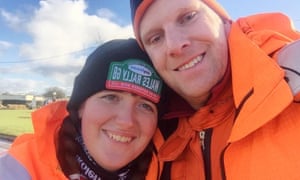Silverstone marshals wary of extra risks to F1 going behind closed doors | Sport
“We are like one big family,” says Carolyn Doyle of the bond between the marshals of the British Grand Prix. “We are there because we love it and we want to achieve the same thing – that’s what makes it really special.”
Much as it does bring great pleasure to this selfless collective, the sport knows their presence is invaluable. As Silverstone considers hosting two consecutive races behind closed doors in July, the volunteer marshals are having to consider the new realities imposed on Formula One by the coronavirus crisis.
Doyle, 28, has been marshalling for five years, during which she has worked at two British Grands Prix. It is clearly a labour of love and one she shares with her fiance, Keith Bond, himself a marshal for 15 years, including seven GPs at the circuit. They are members of the marshals team there and had been selected to work at this year’s race.
The presence of marshals is vital for safety reasons and as F1 attempts to go racing again and potentially hold a double-header at Silverstone, they are as crucial as the drivers and cars. Doyle and Bond usually marshal at circuits across the UK most weekends but they recognise that much as the sport is desperate to get back on track it should only do so if it will not pose any additional risk to the health of the wider community.
“We did a couple of rallies before lockdown but then decided we wouldn’t attend race meetings – we just thought it wasn’t the responsible thing to do,” says Doyle. “People we spoke to had similar feelings. As much as we want to get back to it we recognise what is the responsible decision, even if it is not the desired decision.”

If F1 makes the decision to go ahead at Silverstone, the numbers involved are no small beer. Last year there were 980 people ensuring the safe functioning of the track. These included rescue units, recovery crews and medical coverage, with a doctor on every one of the 34 marshalling posts. That total does include customer service volunteers and spectator marshals, neither of whom would be required for a race without fans, but for track marshals alone the figures are between 350and 400.
For these hundreds of volunteers the outbreak has posed new questions. “On post it is possible to socially distance and marshal,” Bond says. “It would be easy to stand two metres apart. But we couldn’t socially distance if we were dealing with an incident and we needed to be close together. If that was needed we would just get on with it, that is what we are there for.”
F1’s intent is to test all team, broadcasting and logistical personnel for the virus before race meetings. Their concept of a safe, “closed biosphere” will depend on ensuring all the marshals are included but Motorsport UK, which oversees marshalling of the event, has yet to confirm if it will carry out testing. This could be key for many marshals agreeing to take part. “If people are tested and not showing any symptoms that means we can operate in a greatly safer environment,” says Bond.
Doyle, however, expressed concern that the sport must also take into account the bigger picture. “I would feel very uncomfortable if there was an incident and a driver was taken to a hospital,” she says. “Even a driver with a minor injury that requires medical attention is an unnecessary burden on the health system at the moment. We all want to get back to racing, we all miss it, but it seems a slightly unnecessary risk. A lot of fellow marshals work in the NHS and it doesn’t seem fair to put any more on them.”
Nadine Lewis is the national chair of the British Motorsports Marshals Club, whose members also work at the British Grand Prix. She says Motorsport UK is in discussions to address these issues with F1, Silverstone and the government. It must also consider simple logistics far from the paddock that mean a great deal to the volunteers, such as how they physically distance on the campsites where they stay or where they would obtain food with no commercial retailers on site.
If the questions can be answered, the marshalling family is eager to get back to it and as always the sport will owe them a great debt. Typically of this devoted breed it is not one for which they expect any remuneration. “I have never wanted to be paid for doing it, I do it because I love it,” says Doyle.



